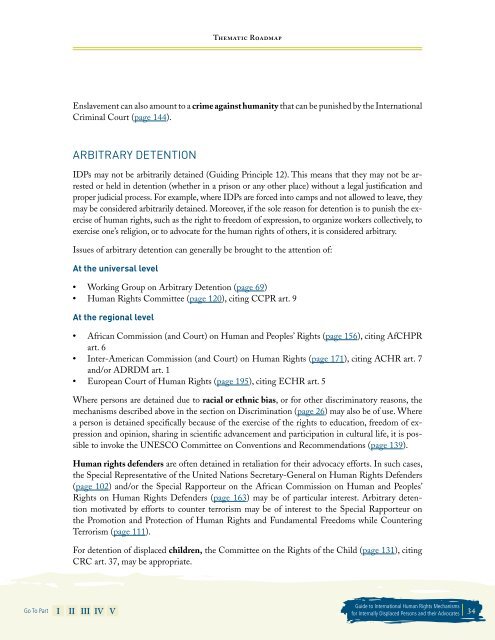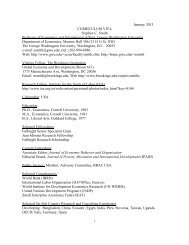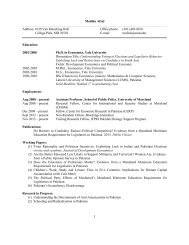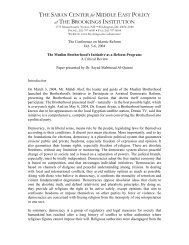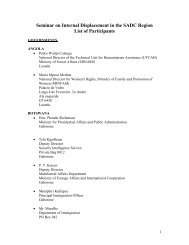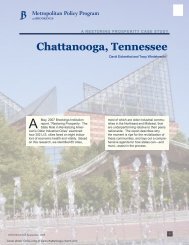Guide to International Human Rights Mechanisms - Brookings
Guide to International Human Rights Mechanisms - Brookings
Guide to International Human Rights Mechanisms - Brookings
You also want an ePaper? Increase the reach of your titles
YUMPU automatically turns print PDFs into web optimized ePapers that Google loves.
Go To Part I II III IV V<br />
Enslavement can also amount <strong>to</strong> a crime against humanity that can be punished by the <strong>International</strong><br />
Criminal Court (page 144).<br />
ARBITRARy.DETENTION<br />
IDPs may not be arbitrarily detained (Guiding Principle 12). This means that they may not be arrested<br />
or held in detention (whether in a prison or any other place) without a legal justification and<br />
proper judicial process. For example, where IDPs are forced in<strong>to</strong> camps and not allowed <strong>to</strong> leave, they<br />
may be considered arbitrarily detained. Moreover, if the sole reason for detention is <strong>to</strong> punish the exercise<br />
of human rights, such as the right <strong>to</strong> freedom of expression, <strong>to</strong> organize workers collectively, <strong>to</strong><br />
exercise one’s religion, or <strong>to</strong> advocate for the human rights of others, it is considered arbitrary.<br />
Issues of arbitrary detention can generally be brought <strong>to</strong> the attention of:<br />
at the universal level<br />
• Working Group on Arbitrary Detention (page 69)<br />
• <strong>Human</strong> <strong>Rights</strong> Committee (page 120), citing CCPR art. 9<br />
at the regional level<br />
Thematic Roadmap<br />
• African Commission (and Court) on <strong>Human</strong> and Peoples’ <strong>Rights</strong> (page 156), citing AfCHPR<br />
art. 6<br />
• Inter-American Commission (and Court) on <strong>Human</strong> <strong>Rights</strong> (page 171), citing ACHR art. 7<br />
and/or ADRDM art. 1<br />
• European Court of <strong>Human</strong> <strong>Rights</strong> (page 195), citing ECHR art. 5<br />
Where persons are detained due <strong>to</strong> racial or ethnic bias, or for other discrimina<strong>to</strong>ry reasons, the<br />
mechanisms described above in the section on Discrimination (page 26) may also be of use. Where<br />
a person is detained specifically because of the exercise of the rights <strong>to</strong> education, freedom of expression<br />
and opinion, sharing in scientific advancement and participation in cultural life, it is possible<br />
<strong>to</strong> invoke the UNESCO Committee on Conventions and Recommendations (page 139).<br />
<strong>Human</strong> rights defenders are often detained in retaliation for their advocacy efforts. In such cases,<br />
the Special Representative of the United Nations Secretary-General on <strong>Human</strong> <strong>Rights</strong> Defenders<br />
(page 102) and/or the Special Rapporteur on the African Commission on <strong>Human</strong> and Peoples’<br />
<strong>Rights</strong> on <strong>Human</strong> <strong>Rights</strong> Defenders (page 163) may be of particular interest. Arbitrary detention<br />
motivated by efforts <strong>to</strong> counter terrorism may be of interest <strong>to</strong> the Special Rapporteur on<br />
the Promotion and Protection of <strong>Human</strong> <strong>Rights</strong> and Fundamental Freedoms while Countering<br />
Terrorism (page 111).<br />
For detention of displaced children, the Committee on the <strong>Rights</strong> of the Child (page 131), citing<br />
CRC art. 37, may be appropriate.<br />
<strong>Guide</strong> <strong>to</strong> <strong>International</strong> <strong>Human</strong> <strong>Rights</strong> <strong>Mechanisms</strong><br />
for Internally Displaced Persons and their Advocates


